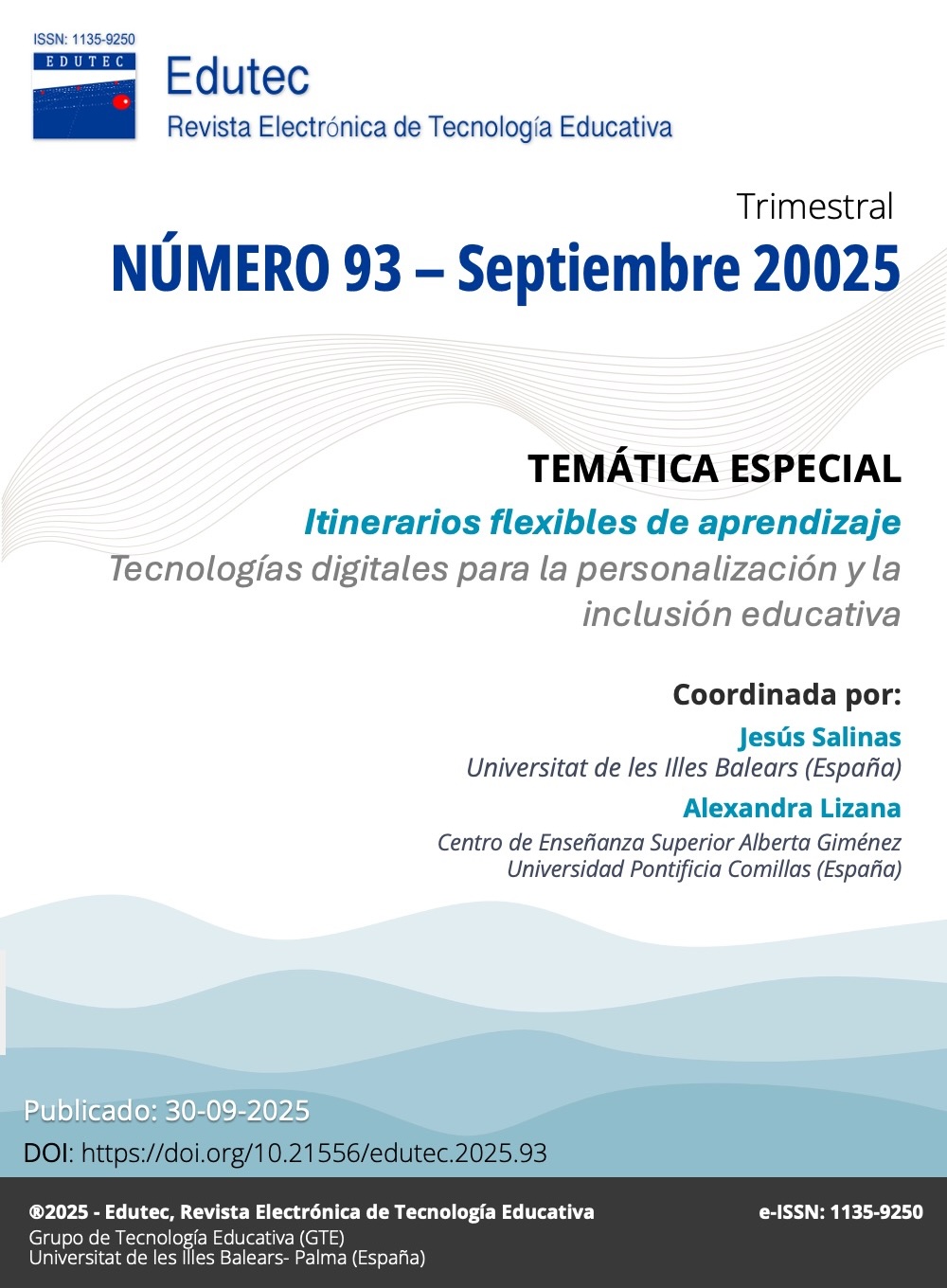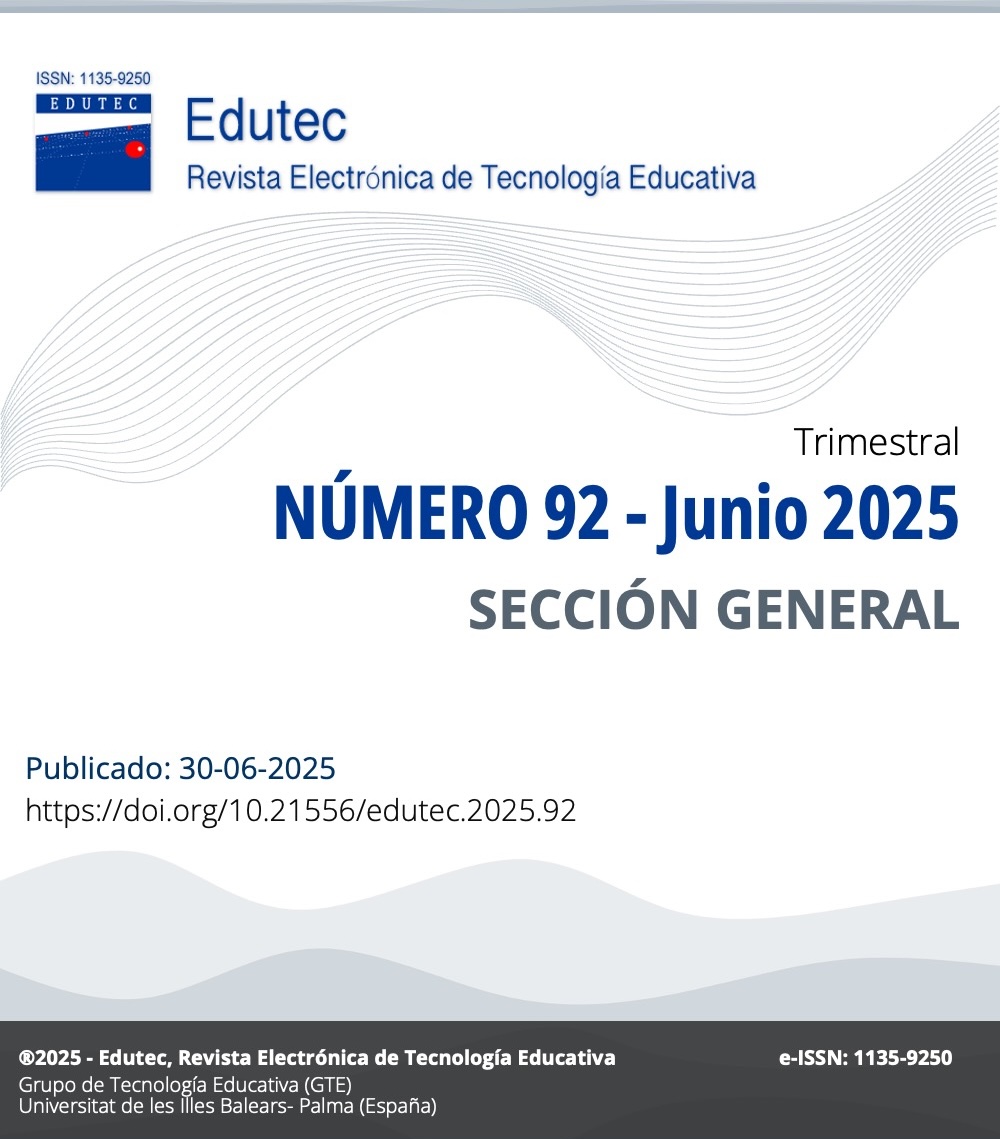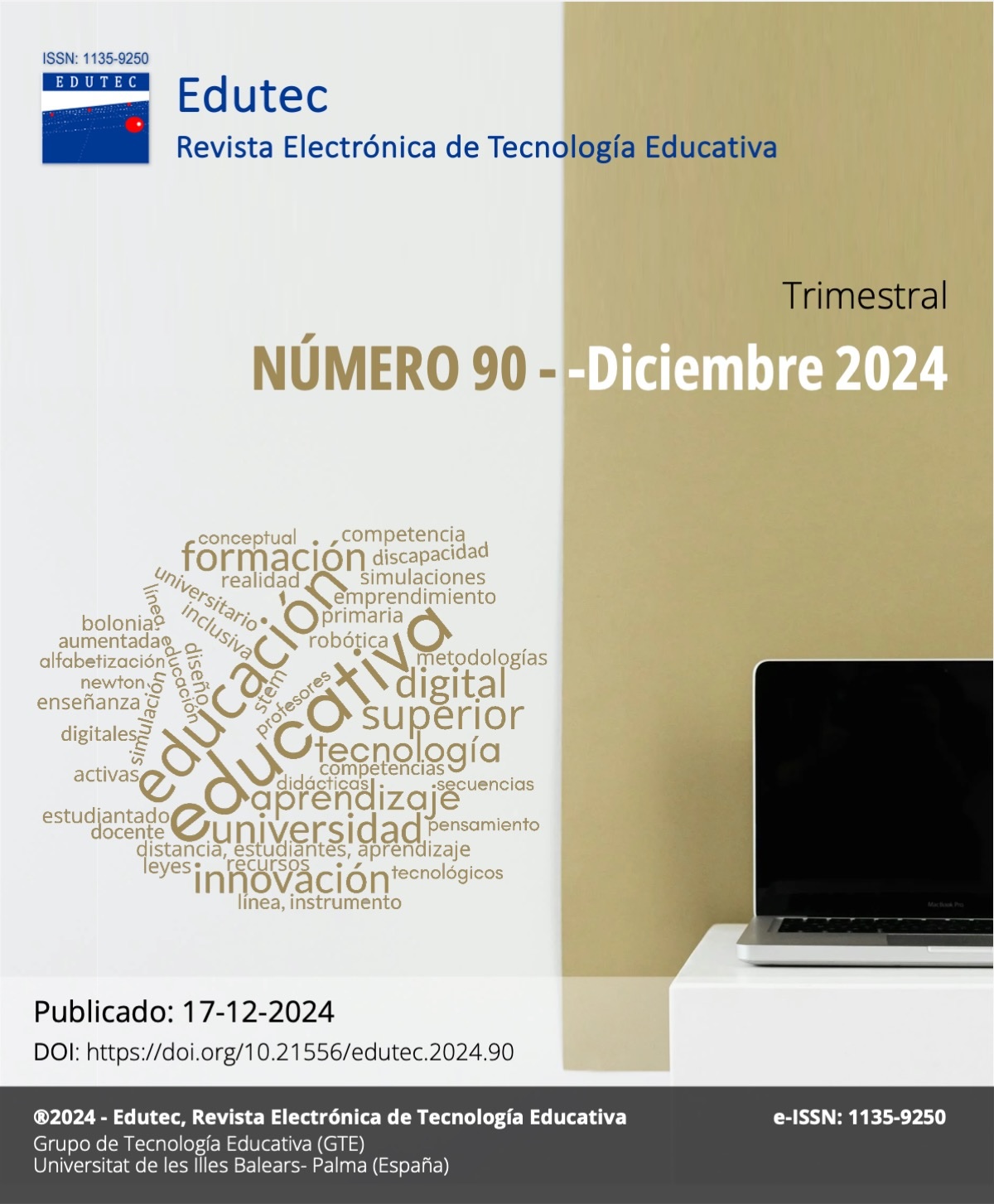Archives
-

Edutec Issue 93 - September 2025
No. 93 (2025)Issue 93 of Edutec. Electronic Journal of Educational Technology features a special thematic section entitled “Flexible Learning Itineraries. Digital technologies for personalization and educational inclusion”, coordinated by Jesús Salinas (University of the Balearic Islands) and Alexandra Lizana (CESAG – Comillas Pontifical University). This section brings together eight contributions that, from diverse and contextualized perspectives, address the design of flexible learning itineraries across different educational settings. The articles explore didactic strategies, learning environments, and curricular proposals that respond to contemporary challenges of inclusion, personalization, and equity. Drawing on experiences developed in rural, urban, school, and university contexts, this section offers the academic community a set of models, reflections, and educational evidence that may serve as a reference for advancing and consolidating transformative pedagogical practices.
The general section includes nine articles that reflect the diversity of current research lines in the field of educational technology. Among them are contributions on digital competence in higher education, frameworks for artificial intelligence competencies, the use of virtual reality and AI-enhanced interventions in language learning, as well as studies on the attention economy, the role of ICT coordinators, educational innovation, and teachers’ perceptions of emerging technologies.
-

Edutec Issue 92 - June 2025
No. 92 (2025)Issue 92 (June 2025) of Edutec presents a selection of articles that address various dimensions of digital transformation in education, with particular focus on teacher training and the university context. The contributions cover key topics such as digital competence among pre-service teachers, technological literacy, the design of innovative teaching strategies, and the growing use of artificial intelligence in educational settings.
The articles include experiences from different countries and examine proposals such as microlearning, blended learning, learning landscapes, and transmedia skills. They also explore the educational use of tools like ChatGPT, chatbots, virtual reality, and gamification, along with policy and structural issues such as web accessibility in universities and the impact of regulatory changes on university entrance exams.
-

SPECIAL SECTION: University didactics
No. 91 (2025)Issue 91 of Edutec, Revista Electrónica de Tecnología Educativa includes a special thematic section focused on university didactics, under the title “Didáctica Universitaria. Nuevos alfabetismos para entornos expandidos”. Coordinated by Cristóbal Suárez-Guerrero, Amaia Arroyo-Sagasta, and Mariana Ferrarelli, this section offers a critical and renewed perspective on university teaching in hybrid contexts, exploring new didactic approaches, forms of agency, and teacher literacies.
The general section features research focused on the use of digital technologies in education, addressing topics such as artificial intelligence, virtual worlds, media literacy, digital competences, and playful methodologies, among other areas of academic interest.
-

Edutec Issue 90 - December 2024
No. 90 (2024)Issue 90 (December 2024) of Edutec brings together research highlighting the impact of technology at different educational levels. Among the topics covered are teachers' self-perception of robotics and its relationship with innovation and entrepreneurship in primary school; conceptual learning of Newton's laws through augmented reality simulations; and a methodology for integrating STEM teacher training in primary and secondary education. In addition, studies are presented on digital skills in university students, the use of immersive technologies in higher education and proposals to promote inclusion through technological resources for students with disabilities. This issue offers a vision of how educational technologies are transforming teaching, inclusion and learning, contributing to the development of skills for the challenges of the future.
-

SPECIAL SECTION: Artificial intelligence in the evaluation and personalization of learning
No. 89 (2024)Issue 89 of Edutec features a special section on Artificial Intelligence in Assessment and Personalised Learning, coordinated by José Luis Serrano (University of Murcia) and Juan Moreno-García (University of the Balearic Islands). The eight articles explore the impact of technologies such as machine learning, chatbots, and intelligent tutoring systems, addressing both their potential and challenges in education.
The general section includes three studies: the use of ICT in hospital classrooms, the influence of socio-economic status on secondary students' self-perception of digital competence, and the use of social media and mobile learning in Physical Education.
-

SPECIAL ISSUE: Microlearning and technology
No. 88 (2024)Issue 88 of Edutec includes a special thematic section of relevance and timeliness: "Microlearning and Technology." This section has been coordinated by Víctor Amar Rodríguez, Manuel Francisco Romero Oliva, and Hugo Heredia Ponce from the University of Cádiz (Spain). In this special section, nine articles explore various facets of microlearning and its integration with technology.
Additionally, the general section includes three articles that address current and relevant topics in the field of education and technology, such as the validation of electronic portfolio models, the improvement of teachers' digital competence, and the evaluation of digital literacy in students.
We hope that this issue will be of interest and utility to researchers, professionals, as well as students and enthusiasts of educational technology.
-

SPECIAL ISSUE: Digital platforms and datafication in the educational system. Possibilities and challenges
No. 87 (2024)As a consequence of the transformations initiated in recent years and accelerated in the context of the COVID-19 pandemic, the penetration of new infrastructures, digital platforms and data-intensive tools in national education systems has intensified (Mann et al. 2021; Williamson & Hogan, 2020; Pangrazio et.al 2022). This phenomenon is rapidly transforming teaching-learning processes and affecting dimensions such as school justice, privacy and the right to education.
In part, this is due to the growing importance of BigTech corporations, which have an increasing influence on the design of educational policy and the creation of new educational markets through the sale and distribution of commercial digital devices and platforms to governments and their educational systems (Sancho et al., 2020; Saura et al., 2022).
-

SPECIAL ISSUE: Data ecosystems in education: opportunities and challenges
No. 86 (2023)Issue 86 of Edutec introduces two different sections.
Firstly, a special thematic section titled "Issues, Shadows, and Challenges of Data Ecosystems in Education." Coordinated by Linda Castañeda (University of Murcia) and Lesley Gourlay (University College London), this section features 5 articles exploring topics such as data literacy for citizens, ethics in educational datafication, and digital data management in primary education.
Secondly, the general section includes 6 papers covering various themes, from technology-based educational models to the integration of social networks in the training of civil engineering professionals.
-

Edutec Issue 84- June 2023
No. 84 (2023)In this issue, seven articles are presented that address different approaches and trends in the integration of technology in education. From exploring robotics in mathematics education in primary schools, to implementing flipped learning in higher education, to the use of virtual reality, augmented reality, and 360° video in the university context. The potential of augmented reality as a didactic resource in Biology learning is also examined, along with an investigation of teachers' attitudes towards e-learning and an analysis of the impact of COVID-19 on 21st-century digital skills in higher education. Finally, the importance of video lessons is highlighted, showcasing how they add a human touch to virtual learning environments.
-

SPECIAL ISSUE: Digital Technologies in Education: Focusing on Ethics
No. 83 (2023)This special issue opens the door to researchers and professionals to share the results of their studies and experiences or to share their reflections, reviews and essays on the importance and impact of ethics in digital technologies in education in any of the many ways in which it is, or should be, present.
-

Special issue: Hacker spirit. Empowering digital citizens
No. 82 (2022)Based on the hacker movement inspired by Pekka Himanen (The hacker's ethics and the spirit of the information age), this monograph seeks to deepen the debate on the approach of these movements to education and school in particular. It starts from the principles of the hacker movement to envision and propose a hacker-style education: the strong presence of collaboration; doing in love with one's own doing; experimentation as a formative process; error being an important element for formative processes; among others.
It is strategic to think about the movements around free software, open access, the possibilities of Open Educational Resources (OER) in connection with the debate on copyright and the various possibilities of licensing scientific, cultural and educational materials, and going further, the development of artificial intelligence, machine-learning, or the use of blockchain. These issues present us with a major challenge in the face of the massive presence of large digital platforms in education, known as the big techs or GAFAM (acronym for Google, Amazon, Facebook, Apple and Microsoft), which dominate the educational field in a process identified with a colonisation of public education in much of the Western world.
So this monograph has this objective: to aggregate and publish studies and experiences that face such challenges in order to become a favourable environment for the collective production of meanings and knowledge about hacker education.
-

Special Issue: Flexible education in the age of open knowledge
No. 79 (2022)Editors of the Special Issue:
- Jesús Salinas jesus.salinas@uib.es
- Olga Lucía Agudelo oagudelo@aulasamigas.com
Keywords: flexible education, flexible learning, situated learning, instructional design, personal learning environments, flexible learning itineraries
The concept of flexibility is found more and more frequently when talking about higher education and the responses that educational institutions are giving to the demands and pressures to which they are subjected. Flexibility is one of the most important qualities of the new learning environments. It involves giving the student the possibility of actively participating in making decisions about learning and implies a new conception of administrative organization, materials, communication systems, mediation and, above all, of the methodologies to be implemented. Van den Brande (1993) also refers to this when he calls for greater flexibility through adaptability to a diversity of learner needs, models, learning scenarios and media combinations.
This issue pretends to be contributing to the academic community with the compilation and dissemination of research and experiences related to models, curricular design, learning environments, new methodologies, tools and technological resources; as well as other lines of work that serve to consolidate and develop flexible education.
-

Special Issue: Service-Learning in Digital Technology Environments
No. 78 (2021)Service-Learning is a pedagogical approach, an experiential teaching methodology and a strategy of solidarity commitment with the community that allows students to work on real needs of the environment in order to improve it. Digital technology has been incorporated into Service-Learning by mediating the projects, facilitating their development and supporting the processes. But it also gives new meanings to what we thought was relegated to the local, face-to-face space, making new approaches or frameworks necessary that integrate the different approaches to what is commonly known as virtual Service-Learning.
Editors of the Special Issue:
- Berta Paz Lourido; bpaz@uib.es
- Bárbara de Benito Crosetti; barbara.debenito@uib.es
In this special issue, we have thirteen articles covering different types of studies, both theoretical and applied. Included are Service-Learning projects that make use of social networks, digital applications and other communication technologies that have been developed at different educational levels from early childhood education to university. The service has been carried out in different fields such as inclusive education or health, among others. The collected works contribute to increase knowledge, improve training, facilitate transfer and promote the institutionalization of Service-Learning and are a good reflection of the growing interest in Service-Learning in technological environments.
-

SPECIAL ISSUE: Hospitalary pedagogy and ICT: flexible, inclusive and solidary education for the improvement of the quality of life.
No. 77 (2021)Special issue coordinators:
- Francisca Negre (Universitat de les Illes Balears) - xisca.negre@uib.es
- Sebastià Verger (Universitat de les Illes Balears) - s.verger@uib.es
Illness is a situation that might mean a very shocking experience for the people that suffer them, their families and the professionals who are committed to provide them the best possible quality of life. From within these collectives, the education and sanitary professionals have to assume the responsibility of putting all of the human and material resources at their hand to achieve that goal. Between these resources, the ICT offer a great number of possibilities, specially to the teaching teams, enabling, not only to continue with their learnings, but also maintain their social and leisure relations and, in general, to ease the normalitzation of the situation without causing large fractures in their daily life.
The ICT is also a valuable tool for these professionals so that they can attend the demands of the people in an illness situation and their families, improving the coordination and comunication between these educational and sanitary groups involved in the regularization and management of their health and training.
The use of these technological resources must be accompanied by actions that allow to focus the education from an inclusive, equitable and solidary perspective, easing the answer to their needs, the development of all of their potential and, definitely, guaranteeing the fulfillment of their rights as a person.
-

SPECIAL ISSUE: Technologies for teaching in Early Childhood Education
No. 76 (2021)Editors of the Special Issue:
Santos Urbina Ramírez (University of the Balearic Islands, Spain)
santos.urbina@uib.esIsabel M. Solano Fernández (University of Murcia, Spain)
imsolano@um.esThere is a growing interest in the role that technological resources can play at an early age. Although scientific production on the subject has been increasing in recent years, it is necessary to increase the knowledge base to support the numerous practices that take place in educational centres and, why not, outside the formal context.
This special issue aims to contribute to this, through different contributions that study the subject from different perspectives and which we have grouped into three blocks: the first deals with the use of digital devices in early childhood and the role of families; the second deals with the subject of digital resources in Early Childhood Education; finally, digital competence is the focus of the third block.
-

SPECIAL ISSUE:Virtual mobility: opening up educational mobilities
No. 75 (2021)Editors of the Special Issue:
Gemma Tur Ferrer (University of the Balearic Islands, Spain)
gemma.tur@uib.esIlona Buchem (Beuth University of Applied Sciences Berlin, Germany)
buchem@beuth-hochschule.deThe characterization virtual mobility is based on three main conceptual pillars – international, digital and collaborative. We understand that these characteristics are common to other related concepts although an institutional agreement and the transcript of records for the exchange and recognition of credits seems to be a distinct characteristic of virtual mobility. A recent approach to virtual mobility has added the dimension of open education as the fourth pillar of virtual mobility and the new concept has been framed as Open Virtual Mobility. These different approaches show that the concept of virtual mobility can be interpreted and designed depending on the actual objectives, practices and educational contexts, as shown in the articles in this special issue.
-

SPECIAL ISSUE Co-design of Technology-Enhanced Learning Experiences - December 2020
No. 74 (2020)Editors of the Special Issue:
Victoria I. Marín (University of Oldenburg, Germany)
victoria.marin@uni-oldenburg.deSara L. Villagrá (University of Valladolid, Spain)
sarena@pdg.uva.esLearning design is an emerging topic of research in the field of educational technology that has a long history, which has grown in scope and influence over time. Besides, the emergence of new publications and projects in recent years in the area shows that the design and, concretely, the co-design of technology-enhanced learning (TEL) experiences is today a topic of increasing interest in the field of educational technology. However, despite the development of theoretical frameworks, tools and proposals aimed at helping teachers in this endeavour, there are several limitations in the sustainability and scalability of these approaches when these technologies are called to be integrated into teachers' educational practices.
For this special issue, we want to provide a broad overview of educational co-design in particular, looking for a wide range of contributions that add value to both theoretical underpinnings and the development of fieldwork experiences aimed at understanding how TEL experiences are being carried out in different educational settings. Likewise, we also want to highlight the shortage of institutional support for the development of educational policies devoted to cultural, ethical and social needs linked to the co-design of pedagogies for the digital era.
Therefore, this special issue is driven by the following question: what are the most effective educational practices and theories in the field of co-design?
Keywords: learning design, educational technologies, technology-enhanced learning (TEL), co-design.
-

NÚMERO ESPECIAL: Mirando al futuro de la Tecnología Educativa - Septiembre 2020
No. 73 (2020)Editors of the Special Issue:
Adolfina Pérez Garcias (University of the Balearic Islands, Spain)
fina.perez@uib.esJuan González Martínez (University of Girona, Spain)
juan.gonzalez@udg.eduOn the occasion of the 25th anniversary of the association, the EDUTEC magazine proposes a special issue that provides an opportunity to analyse the evolution of this quarter of a century in relation to educational technology, allowing us to highlight the advances in the field of knowledge, as well as to project the most important emerging issues and challenges into the future. We are thinking of a special issue that vindicates the most relevant contributions and redirects research towards the real challenges, both in the non-formal and formal educational spheres; a special issue that also gives value to the need to plan the use of educational technology and to refine the conceptualisation of technology itself as a means and not as an end.
-
Edutec Nº 71 - January - March 2020
No. 71 (2020) -
Edutec 70 - October - December 2019
No. 70 (2019) -
Edutec Nº 69 - July-September 2019
No. 69 (2019) -

Monographic Edutec 2018 Congress Education with technology: a social commitment
No. 68 (2019)Edutec2018 Special. Special issue of the journal Edutec that collects articles made from a selection of the best papers presented at the Congress Edutec 2018 Education with technology: a social commitment, held in Lleida from 24 to 26 October 2018.
-
Edutec Nº 67 - March 2019
No. 67 (2019) -
Issue 66 (2018): Edutec Nº 66 - December 2018
No. 66 (2018) -
Edutec 65 - September 2018
No. 65 (2018) -
Edutec 64 - June 2018
No. 64 (2018)












